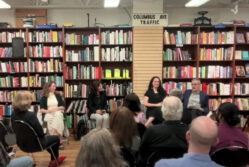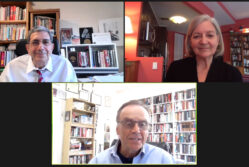Archive Event Highlight

Lowell Thomas Award Winners Discuss ‘The Search’
by Chad Bouchard
Conflict reporting overseas, as well as other kinds of foreign reporting, can too often depict people as reductive stereotypes or victims. In 2011, Kurdish photojournalist Kamaran Najm joined forces with colleagues to launch a photo agency focused on pushing back against those tendencies. But in 2014, the effort came to a halt during a reporting mission with peshmerga fighters, when he was wounded in a firefight with ISIS and disappeared.
On June 19, the OPC hosted an online discussion via Zoom with journalists and people close to the story who worked on a two-part podcast series about Najm’s disappearance, and family and friends’ long mission to track him down.
“The Search,” a series from NPR’s Rough Translation podcast, won this year’s Lowell Thomas Award for best radio, audio, or podcast coverage of international affairs.
The program included award winners Gregory Warner, Karen Duffin and Sebastian Meyer, moderated by Ann Cooper, Professor Emerita of the Columbia Journalism School who served as head judge for this year’s Lowell Thomas jury.
Najm had helped to establish a photo agency focused on depicting a more “wholistic” impression of people often only seen in images of violence. Meyer, who was working as a journalist in the area, joined the agency and became friends with Najm.
Najm was shot in June 2014 while following peshmerga soldiers. Kurdish media at the time reported that he had been killed in the firefight. The next day, Meyer joined family and friends in a search for Najm’s body. But then, a childhood friend and member of the search party received a phone call from Najm himself, calling from captivity. A recording of that call was included in the story.
“He said ‘it’s me, Kamaran,’” Meyer recounted. “I struggle to find words that can really convey how incredible it was, because we were all told and all believed, and all the eyewitnesses said that Kamaran had been shot and he died. And it was this sort of Lazarus moment when he came back to life.”
The group discovered that ISIS soldiers found Najm wounded and bleeding and took him into custody. That phone call launched a search for Najm that would span several years, a story documented in the Rough Translation series. Lowell Thomas Award judges said The Search “reminds us that wars don’t end when fighting stops.”
“Their loss is just one in thousands among Kurdish communities occupied by ISIS, but in telling their story with such honesty and openness,” judges said. “Rough Translation has helped us grasp the very human long-term legacy of conflict.”
Duffin, an NPR reporter and host, met Mayer on a listserv about a year and a half into the search, conducting interviews and following the search. “It became clear that this was a human-scale story that spoke to so many different themes,” she said. “There was no question that it would be a beautiful story and a tribute to Kamaran and the work that he had done.”
Warner, the host of Rough Translation, said the podcast has a similar focus as the agency Kamaran and Meyer had founded. He said he wanted Kamaran’s specific story and details of his life to help humanize the massive number of Iraqis who have disappeared over the last several decades.
“If this were a profile of a Western journalist who went missing, you would learn a lot about their life, and not just about their disappearance. The part of the piece that took the longest and the most thinking was the first sixteen minutes or so when we are building the story of who he was.”
Meyer, who was a key source for the story but also contributed to the reporting, talked about his complicated role as part of the search party, a drastic change from his previous role as a journalist.
“In fact I spent a huge amount of my time trying to enforce a media blackout about the story. Because Kamaran had worked for The Washington Post and Der Spiegel in Germany, there was interest in publishing stories about him,” Mayer said. “Because he was a hostage, you don’t want that to be in the news because you lose control of any sort of information and story, and ISIS might be able to use it to their advantage and against you.”
During the Zoom webinar, Meyer talked about “ambiguous loss,” a term coined by author Pauline Boss, and how friends and family of people who have disappeared suffer from prolonged uncertainty and grieve differently than those who are mourning the death of a loved one. Duffin and Meyer discussed how this term for loss without closure aptly describes what people are experiencing now during the pandemic.
“The pandemic is 100 percent [ambiguous loss]. We’re all living some version of it,” Meyer said. Other examples include caring for someone with prolonged terminal illness, dementia, or undergoing the process of adopting a child, he added.
The International Committee on Missing Persons (ICMP), formed after the Balkan Wars, estimate that since the 1980s over a million Iraqis have gone missing and have not been found.
“Which means that’s a million families and more than a million friends who don’t know where their loved one has gone,” Meyer said. “And [ICMP] thinks that just having so many people missing loved ones is a blockage of forming civil society in Iraq today.”
Duffin referenced a poem from a Kurdish poet that was included in Meyer’s book about his experience, which was almost included in the podcast series but was cut for time, saying that anyone who wants to lay a wreath at the tomb of the unknown soldier can lay it at “any rock, at any Mosque, at any home, and under every yard of sky.” The last part of that passage is the title of Meyer’s book.
Duffin said she felt that she learned a lot from Kamaran, despite never having met him. She quoted him as saying “break the rules, make new rules, but better than the last ones,” a phrase that helped her to deepen her reporting and to look for ways to humanize people in stories.
“Even before he was kidnapped he had pretty much given up everything that was familiar to him, to chase something that he believed in. He was going against everybody in his life that he loved. I take a lot from his courage.”
Check out the winning podcast episodes here:
Click the window below to watch a playlist of video clips from the program.




